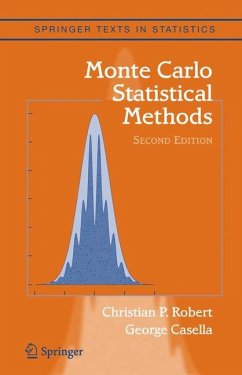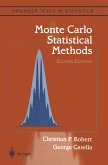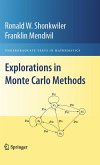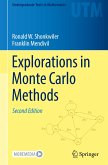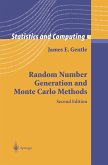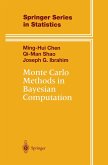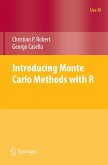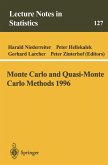Monte Carlo statistical methods, particularly those based on Markov chains, are now an essential component of the standard set of techniques used by statisticians. This new edition has been revised towards a coherent and flowing coverage of these simulation techniques, with incorporation of the most recent developments in the field. In particular, the introductory coverage of random variable generation has been totally revised, with many concepts being unified through a fundamental theorem of simulation
There are five completely new chapters that cover Monte Carlo control, reversible jump, slice sampling, sequential Monte Carlo, and perfect sampling. There is a more in-depth coverage of Gibbs sampling, which is now contained in three consecutive chapters. The development of Gibbs sampling starts with slice sampling and its connection with the fundamental theorem of simulation, and builds up to two-stage Gibbs sampling and its theoretical properties. A third chapter covers the multi-stage Gibbs sampler and its variety of applications. Lastly, chapters from the previous edition have been revised towards easier access, with the examples getting more detailed coverage.
This textbook is intended for a second year graduate course, but will also be useful to someone who either wants to apply simulation techniques for the resolution of practical problems or wishes to grasp the fundamental principles behind those methods. The authors do not assume familiarity with Monte Carlo techniques (such as random variable generation), with computer programming, or with any Markov chain theory (the necessary concepts are developed in Chapter 6). A solutions manual, which covers approximately 40% of the problems, is available for instructors who require the book for a course.
Christian P. Robert is Professor of Statistics in the Applied Mathematics Department at Université Paris Dauphine, France. He is also Head of the Statistics Laboratoryat the Center for Research in Economics and Statistics (CREST) of the National Institute for Statistics and Economic Studies (INSEE) in Paris, and Adjunct Professor at Ecole Polytechnique. He has written three other books and won the 2004 DeGroot Prize for The Bayesian Choice, Second Edition, Springer 2001. He also edited Discretization and MCMC Convergence Assessment, Springer 1998. He has served as associate editor for the Annals of Statistics, Statistical Science and the Journal of the American Statistical Association. He is a fellow of the Institute of Mathematical Statistics, and a winner of the Young Statistician Award of the Société de Statistique de Paris in 1995.
George Casella is Distinguished Professor and Chair, Department of Statistics, University of Florida. He has served as the Theory and Methods Editor of the Journal of the American Statistical Association and Executive Editor of Statistical Science. He has authored three other textbooks: Statistical Inference, Second Edition, 2001, with Roger L. Berger; Theory of Point Estimation, 1998, with Erich Lehmann; and Variance Components, 1992, with Shayle R. Searle and Charles E. McCulloch. He is a fellow of the Institute of Mathematical Statistics and the American Statistical Association, and an elected fellow of the International Statistical Institute.
There are five completely new chapters that cover Monte Carlo control, reversible jump, slice sampling, sequential Monte Carlo, and perfect sampling. There is a more in-depth coverage of Gibbs sampling, which is now contained in three consecutive chapters. The development of Gibbs sampling starts with slice sampling and its connection with the fundamental theorem of simulation, and builds up to two-stage Gibbs sampling and its theoretical properties. A third chapter covers the multi-stage Gibbs sampler and its variety of applications. Lastly, chapters from the previous edition have been revised towards easier access, with the examples getting more detailed coverage.
This textbook is intended for a second year graduate course, but will also be useful to someone who either wants to apply simulation techniques for the resolution of practical problems or wishes to grasp the fundamental principles behind those methods. The authors do not assume familiarity with Monte Carlo techniques (such as random variable generation), with computer programming, or with any Markov chain theory (the necessary concepts are developed in Chapter 6). A solutions manual, which covers approximately 40% of the problems, is available for instructors who require the book for a course.
Christian P. Robert is Professor of Statistics in the Applied Mathematics Department at Université Paris Dauphine, France. He is also Head of the Statistics Laboratoryat the Center for Research in Economics and Statistics (CREST) of the National Institute for Statistics and Economic Studies (INSEE) in Paris, and Adjunct Professor at Ecole Polytechnique. He has written three other books and won the 2004 DeGroot Prize for The Bayesian Choice, Second Edition, Springer 2001. He also edited Discretization and MCMC Convergence Assessment, Springer 1998. He has served as associate editor for the Annals of Statistics, Statistical Science and the Journal of the American Statistical Association. He is a fellow of the Institute of Mathematical Statistics, and a winner of the Young Statistician Award of the Société de Statistique de Paris in 1995.
George Casella is Distinguished Professor and Chair, Department of Statistics, University of Florida. He has served as the Theory and Methods Editor of the Journal of the American Statistical Association and Executive Editor of Statistical Science. He has authored three other textbooks: Statistical Inference, Second Edition, 2001, with Roger L. Berger; Theory of Point Estimation, 1998, with Erich Lehmann; and Variance Components, 1992, with Shayle R. Searle and Charles E. McCulloch. He is a fellow of the Institute of Mathematical Statistics and the American Statistical Association, and an elected fellow of the International Statistical Institute.
From the reviews: MATHEMATICAL REVIEWS "Although the book is written as a textbook, with many carefully worked out examples and exercises, it will be very useful for the researcher since the authors discuss their favorite research topics (Monte Carlo optimization and convergence diagnostics) going through many relevant references...This book is a comprehensive treatment of the subject and will be an essential reference for statisticians working with McMC." From the reviews of the second edition: "Only 2 years after its first edition this carefully revised second edition accounts for the rapid development in this field...This book can be highly recommended for students and researchers interested in learning more about MCMC methods and their background." Biometrics, March 2005 "This is a comprehensive book for advanced graduate study by statisticians." Technometrics, May 2005 "This excellent text is highly recommended..." Short Book Reviews of the ISI, April 2005 "This book provides a thorough introduction to Monte Carlo methods in statistics with an emphasis on Markov chain Monte Carlo methods. ... Each chapter is concluded by problems and notes. ... The book is self-contained and does not assume prior knowledge of simulation or Markov chains. .... on the whole it is a readable book with lots of useful information." (Søren Feodor Nielsen, Journal of Applied Statistics, Vol. 32 (6), August, 2005) "This revision of the influential 1999 text ... includes changes to the presentation in the early chapters and much new material related to MCMC and Gibbs sampling. The result is a useful introduction to Monte Carlo methods and a convenient reference for much of current methodology. ... The numerous problems include many with analytical components. The result is a very useful resource for anyone wanting to understand Monte Carlo procedures. This excellent text is highly recommended ... ." (D.F. Andrews, Short Book Reviews, Vol. 25 (1), 2005) "You have to practice statistics on a desert island not to know that Markov chain Monte Carlo (MCMC) methods are hot. That situation has caused the authors not only to produce a new edition of their landmark book but also to completely revise and considerably expand it. ... This is a comprehensive book for advanced graduate study by statisticians." (Technometrics, Vol. 47 (2), May, 2005) "This remarkable book presents a broad and deep coverage of the subject. ... This second edition is a considerably enlarged version of the first. Some subjects that have matured more rapidly in the five years following the first edition, like reversible jump processes, sequential MC, two-stage Gibbs sampling and perfect sampling have now chapters of their own. ... the book is also very well suited for self-study and is also a valuable reference for any statistician who wants to study and apply these techniques." (Ricardo Maronna, Statistical Papers, Vol. 48, 2006) "This second edition of 'Monte Carlo Statistical Methods' has appeared only five years after the first ... the new edition aims to incorporate recent developments. ... Each chapter includes sections with problems and notes. ... The style of the presentation and many carefully designed examples make the book very readable and easily accessible. It represents a comprehensive account of the topic containing valuable material for lecture courses as well as for research in this area." (Evelyn Buckwar, Zentrablatt MATH, Vol. 1096 (22), 2006) "This is a useful and utilitarian book. It provides a catalogue of modern Monte carlo based computational techniques with ultimate emphasis on Markov chain Monte Carlo (MCMC) ... . an excellent reference for anyone who is interested in algorithms for various modes of Markov chain (MC) methodology ... . a must for any researcher who believes in the importance of understanding what goes on inside of the MCMC 'black box.' ... I recommend the book to all who wish to learn about statistical simulation." (Wesley O. Johnson, Journal of the American Statistical Association, Vol. 104 (485), March, 2009)

